If you’re like me, a fervent enthusiast of technology, you probably know that Chromebooks have come a long way since their inception. They are not just budget-friendly alternatives to regular laptops; they are versatile, fast, and capable of fulfilling most of our digital needs. Yet, many potential users back off at the thought of being unable to code on a Chromebook without delving into the Linux world.
Allow me to dismantle this myth as I walk you through an enriched guide on how to immerse yourself in coding on a Chromebook without needing to use Linux. And guess what? It is an exhilarating journey that I have personally been on. Let us dive right in!
Embracing the simplicity: Why avoid Linux?
Before we jump into the juicy details, let’s take a step back to understand why one might opt to avoid Linux while coding on a Chromebook. Linux, albeit powerful and versatile, can sometimes be a bit too complex for beginners or for those who prefer a more straightforward approach to coding. Sometimes, simplicity is what we crave, especially when we are just starting out on our coding journey.
As a tech enthusiast who has juggled between various operating systems, I have nurtured a soft spot for the straightforward yet powerful nature of Chromebooks. While Linux undoubtedly offers a rich experience for coders, it comes with a learning curve that not everyone is willing to undertake. And this is where the charm of Chromebook comes in, offering a delightful coding experience without the complexities of Linux.
How to code on Chromebook without Linux?
Discovering the alternatives: Coding platforms to the rescue
In the vibrant world of coding, there’s always more than one path to achieve your goal. Chromebooks are steadily carving out a place in the developer’s toolkit, and even without Linux, we have a bevy of platforms and tools that can cater to our coding endeavors. Here, I’m excited to share a few alternatives that have caught my attention and might very well transform your coding journey on a Chromebook:
Online coding platforms
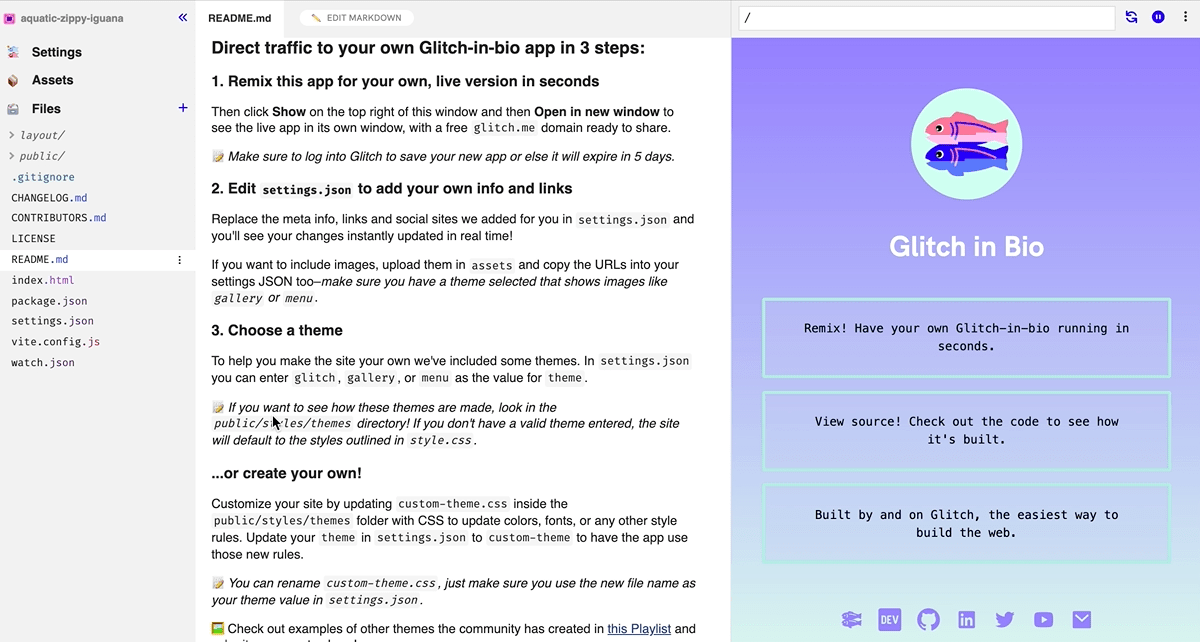
Glitch web app and website builder (Image Courtesy: Glitch)
You would be amazed at the sheer number of online platforms available that allow you to code directly from your browser. These platforms are a testament to the fact that coding on a Chromebook without Linux is not only possible but can be a delightful experience.
- Replit: This has been a revelation for me. Replit allows you to code in various languages directly from your browser without any setup required. What has been particularly captivating for me is its collaborative feature, where you can code along with your peers in real-time, a fantastic tool for team projects or when you’re seeking advice from fellow developers.
- Glitch: A community-driven platform where you can build web apps right from your browser. I love its friendly approach to coding, making it accessible even to those who are just starting their journey. Plus, it’s a fantastic place to discover projects from other creators, providing inspiration and learning opportunities.
- CodePen: I have spent countless hours on CodePen, tweaking and experimenting with different pieces of code. It’s a social development environment that allows you to build, deploy, and get feedback all in one place. Its vibrant community is always a source of inspiration and learning for me.
Code editors and IDEs
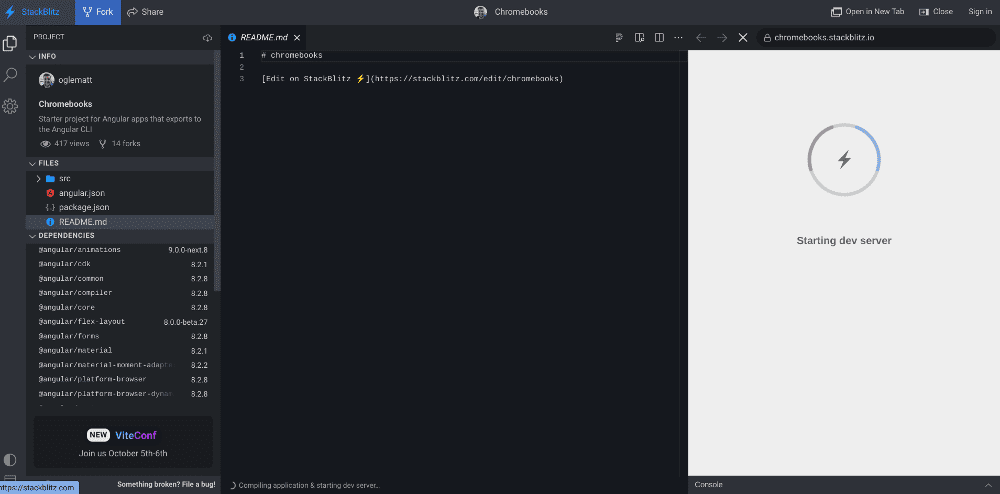
StackBlitz
But online platforms are not your only recourse. Chromebooks now support a variety of code editors and Integrated Development Environments (IDEs) that allow you to code offline as well. Here are some fantastic options:
- Visual Studio Code (Web Version): It is quite exciting that Visual Studio Code, one of the most popular code editors, is available as a web version. It offers a familiar interface and a host of extensions to enhance your coding experience.
- StackBlitz: A powerful online IDE that offers a similar experience to local development environments. It supports a variety of frameworks and libraries, making it a versatile choice for coding on Chromebooks.
Mobile coding applications
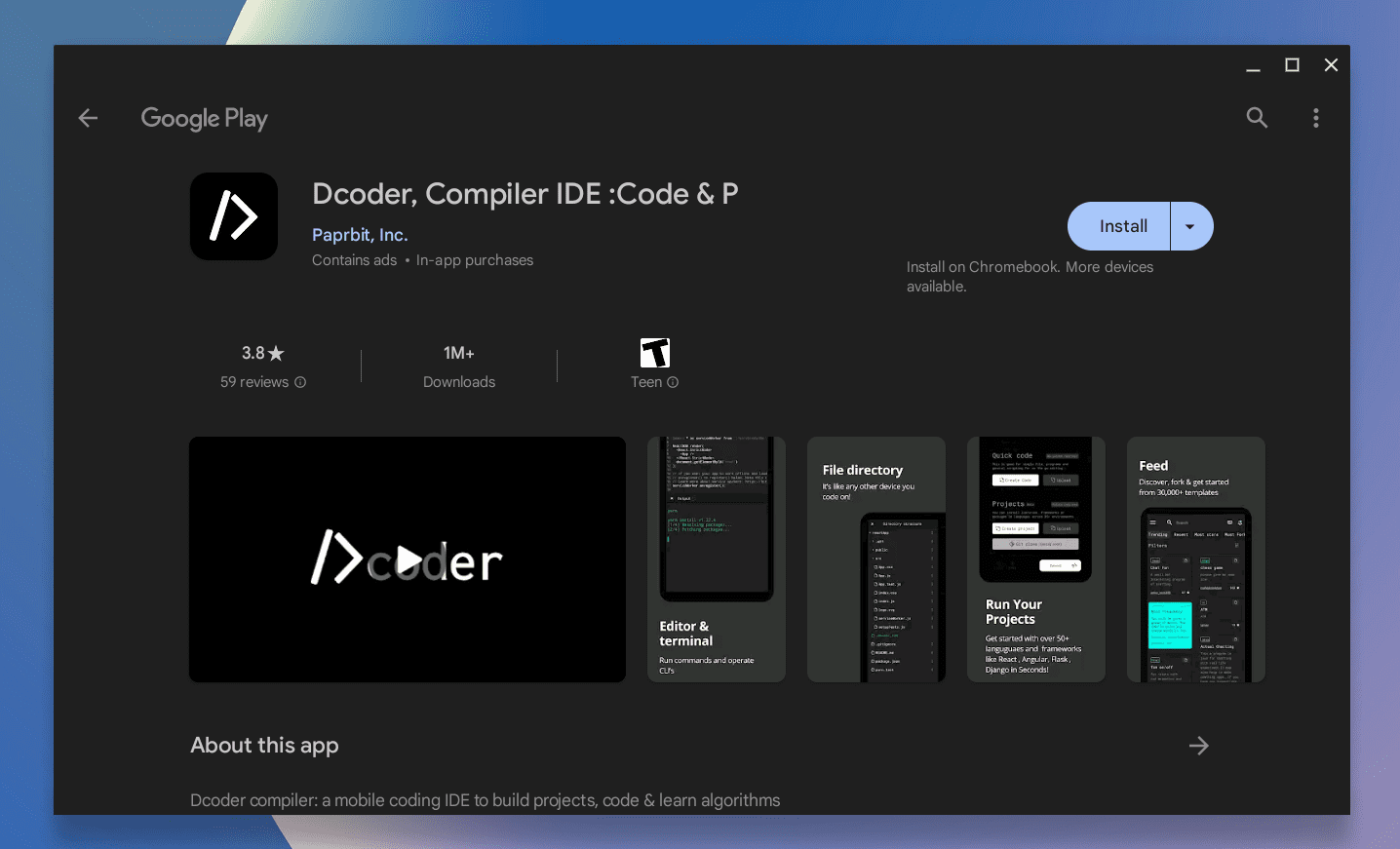
Dcoder Android app on Google Play
Yes, you heard me right! Several mobile applications can transform your Chromebook into a coding powerhouse. These applications are optimized for touch interfaces, and if your Chromebook supports Android apps, this can be a viable option.
- AIDE: This is a complete integrated development environment that supports a plethora of languages and frameworks. I have found it to be incredibly handy when I want to code on the go.
- Dcoder: It’s a mobile IDE that supports more than 50 programming languages. Its rich set of features and sleek interface have often made my coding sessions a breeze.
Setting the perfect environment: Browser extensions and plugins
Plugins to enhance productivity
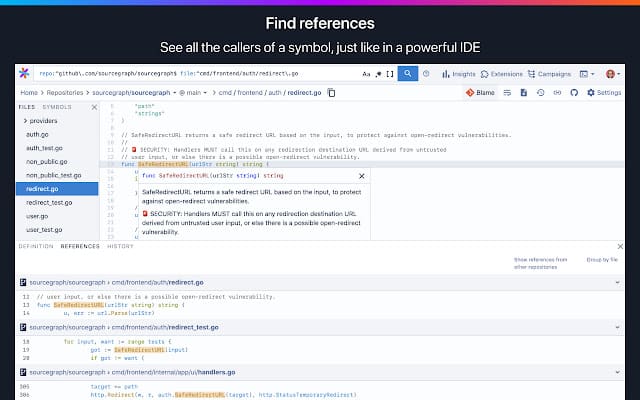
Sourcegraph Chrome extension
To make your coding journey even more fruitful, you can leverage various browser extensions and plugins available. These tools can augment your coding experience by providing features like syntax highlighting, code completion, and more. Here, let me share a few of my personal favorites:
- Better Pull Request for GitHub: This extension is available for Visual Studio Code and integrates GitHub directly into your editor, letting you manage pull requests and issues from a dedicated sidebar. It has been a vital part of my toolkit when managing larger projects.
- Octotree: An extension available on the Chrome Web Store, Octotree adds a file tree to GitHub repositories, making it easier to navigate through project files without leaving your browser. Personally, I find it immensely helpful when reviewing large repositories, as it simplifies finding specific files or folders.
- React Developer Tools: This is a Chrome extension that allows you to inspect a React component tree, including component props, state, and hooks within the Chrome DevTools. From my experience, it offers a tremendous advantage, especially when you are working on complex React projects, making the process of debugging and optimizing your apps much smoother.
- Wappalyzer: This extension, available on the Chrome Web Store, allows you to identify the web technologies used on any website. I find it to be a valuable tool, especially when researching or drawing inspiration from other sites.
- Sourcegraph: A browser extension that offers code navigation and documentation for GitHub repositories. As someone who spends a significant amount of time on GitHub, this extension has been a lifesaver on many occasions.
Securing your code: Reliable extensions to safeguard your work
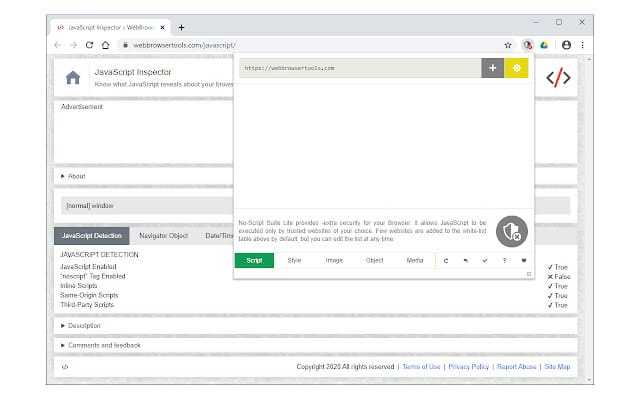
No-Script Suite Lite
In the modern digital age, securing your code is more important than ever. It not only protects your hard work but also ensures the safety of the users who interact with your applications. Here are a couple of extensions that I have found to be quite robust in enhancing security:
- LastPass: In my coding journey, LastPass has been a trustworthy companion, offering password management services that safeguard sensitive information. It helps in generating and storing complex passwords, making the login process not only secure but also quicker.
- uBlock Origin: A powerful ad blocker that not only helps in blocking ads but also protects against tracking and malware. In my experience, it has been quite effective in providing a clean and secure browsing experience, which is crucial when you are working on web development projects.
- Privacy Badger: This extension has been my personal guardian angel online. It automatically learns to block invisible trackers, ensuring a safe and private browsing experience. What I love about this tool is its non-intrusive nature, safeguarding my online presence without hampering the browsing experience.
- NoScript Security Suite: A tool that I use frequently, NoScript allows you to customize the execution of JavaScript, Java, and Flash plugins, providing protection against cross-site scripting attacks (XSS) and Clickjacking. It’s an advanced tool that gives me peace of mind when browsing various websites during my coding research.
I can personally vouch for these extensions, as they have been a part of my toolkit for quite some time. These tools not only enhance the security of your coding environment but also provide a safe and clean browsing experience, which is vital in today’s interconnected world.
I’d recommend trying these extensions personally and sharing your experience with them in the blog post.
Tuning into the community: Learning and collaboration
Join forums and communities
Learning never stops, and what better way to learn than to join communities and forums where like-minded individuals gather. These platforms provide a wealth of knowledge and offer an excellent opportunity for networking.
- Stack Overflow: It is a goldmine of information where you can find answers to your coding queries. It has been my go-to place for seeking solutions to coding problems.
- GitHub: A hub for developers where you can find projects to contribute to, learn from experienced developers, and collaborate on exciting projects.
Participate in hackathons
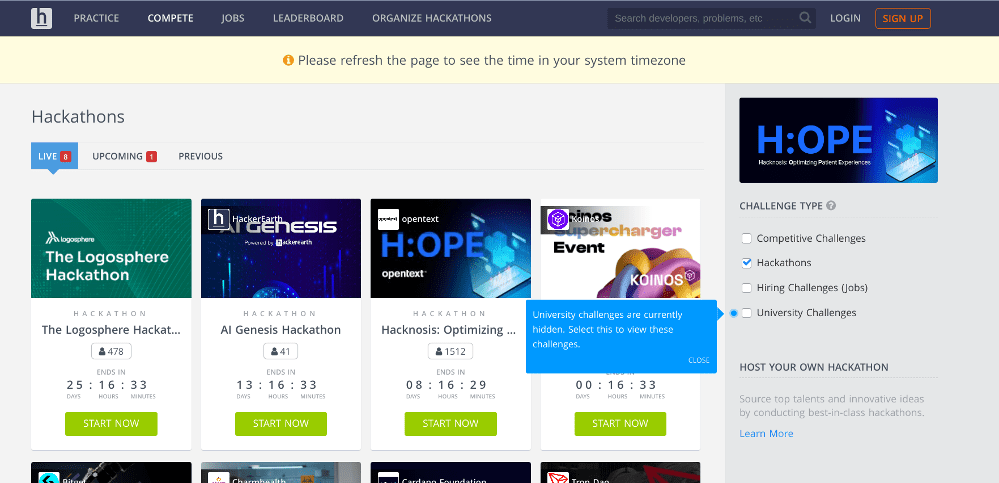
Hackerearth
Participating in hackathons can be an exhilarating experience. It not only provides an opportunity to showcase your skills but also to learn and collaborate with others.
- Devpost: A platform where you can find hackathons to participate in. My personal experiences participating in hackathons have always been enriching.
- Hackerearth: Another popular platform where you can find hackathons and coding challenges. It has been a great place to hone my coding skills.
Navigating potential hurdles: Tips and solutions
As you go on this journey, you might face a few hurdles, but fear not! Here are some tips that have helped me navigate these challenges:
Dealing with connectivity issues
- Work offline: Make sure to choose platforms and tools that allow offline work to prevent disruptions due to connectivity issues.
- Backup regularly: Ensure to back up your code regularly to avoid losing your progress due to unforeseen circumstances.
Enhancing productivity
- Keyboard shortcuts: Learn and use keyboard shortcuts to enhance your productivity. It has significantly boosted my coding speed.
- Breaks are essential: Don’t forget to take regular breaks to prevent burnout. Trust me; it can be a game-changer!
Wrapping up: Your gateway to a delightful coding experience
There we have it, folks! Your comprehensive guide to a delightful and productive coding experience on a Chromebook without Linux. As someone who has navigated this path, I can assure you that it is a rewarding journey filled with learning and opportunities.
I believe the key to a fulfilling coding journey is to explore, learn, and adapt. The tools and platforms mentioned above have been instrumental in my coding journey, providing a perfect blend of simplicity and power.

1 comment
thank you a lot